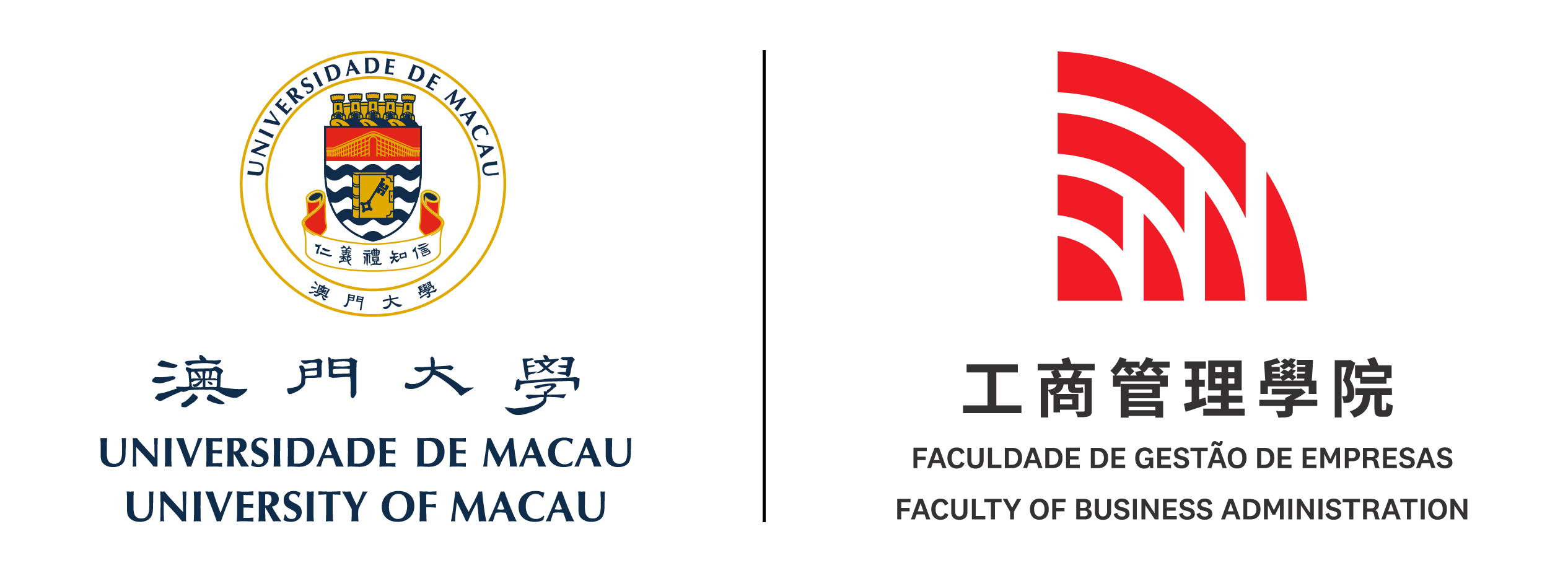
Associate Professor in Marketing
Assistant Dean (Internationalization, Marketing and Communications)
- Hong Kong University of Science and Technology
Doctor of Philosophy, Marketing, 2014 - Fudan University
Bachelor of Science, 2009
- University of Macau Faculty of Business Administration, Macau SAR
Associate Professor, January 2023 to present - Hong Kong Polytechnic University Faculty of Business, Hong Kong SAR
Assistant Professor, July 2016 to December 2022
Director, Behavioral Research Laboratory, September 2016 to January 2020 - Peking University Guanghua School of Management, Beijing, China
Assistant Professor, July 2015 to June 2016 - Hong Kong University of Science and Technology School of Business, Hong Kong SAR
Visiting Assistant Professor, January – May 2015
My research lies at the intersection of consumer psychology and marketing strategy, with three central streams. A unifying theme across these streams is my focus on how marketing can be a force for good, using psychological insights to promote long-term consumer welfare across diverse populations and stages of life.
- Investigating how anthropomorphism and humanization of non-human agents (e.g., robots, AI, or products) affect consumer judgments, emotional responses, and behaviors in both commercial and crisis settings.
- Exploring consumer well-being and emotion regulation, examining how subtle framing and psychological cues in marketing messages can promote resilience, healthier decision-making, and reduced indulgent consumption.
- Focusing on digital persuasion and disadvantaged consumers, including how message design can influence health-related decisions across age groups and socio-economic contexts.
- 2024, University of Macau Faculty of Business Administration (FBA), Outstanding Research Award
- 2022, Hong Kong Research Grants Council (RGC) Competitive General Research Fund, HK$383,137, Principal Investigator
- 2020, Hong Kong Research Grants Council (RGC) Competitive General Research Fund, HK$365,501, Principal Investigator
- 2018, Hong Kong Research Grants Council (RGC) Competitive General Research Fund, HK$454,477, Co-Investigator
- 2018, Hong Kong Polytechnic University Central Research Grant, HK$200,000, Principal Investigator
- 2012, AMA-Sheth Foundation Doctoral Consortium, Fellow
- Undergraduate Courses
- Digital Marketing (MKGT4013)
- Postgraduate Courses
- Consumer Behavior (MKGT7030)
Underline denotes the coauthor as a student at the start of the research project.
- Chen, F., Pang, Y., and Wang, L. (2025), From Stigma to Acceptance: Ethical Implications of Anthropomorphic Design in Healthcare Chatbots, Journal of Business Ethics (FT50), forthcoming.
- Pang, Y., Wang, L. and Chen, F. (2024). Message framing to enhance consumer compliance with disease detection communication for prevention: The moderating role of age. Journal of Consumer Psychology (ABS4*, FT50) (equal first authorship) https://doi.org/10.1002/jcpy.1436
- Winner of JCP Best Paper by Early Career Contributor (2024)
- Cheng, B. H., Zhou, Y., Chen, F. (2023). You’ve got mail! How work e-mail activity helps anxious workers enhance performance outcomes. Journal of Vocational Behavior. (ABS4) https://doi.org/10.1016/j.jvb.2023.103881
- Su, L., Sengupta, J., Li, Y., Chen, F. (2023). Want versus need: How linguistic framing influences responses to crowdfunding appeals. Journal of Consumer Research. (ABS4*, UTD, FT50) https://doi.org/10.1093/jcr/ucad033
- Media Coverage: Stanford Social Innovation Review
- Chen, F., Huang, S. (2023). Robots or humans for disaster response? Impact on consumer prosociality and possible explanations. Journal of Consumer Psychology, 33(2), 432-40. (ABS4*, FT50) https://doi.org/10.1002/jcpy.1338
- Media Coverage: Insights by Stanford Business, Stanford Business podcasts
- Chen, F., Sengupta, J., Zheng, J. (2023). When products come alive: Interpersonal communication norms affect how consumers talk about anthropomorphized products. Journal of Consumer Research, 49(6), 1032-52. (ABS4*, UTD, FT50) https://doi.org/10.1093/jcr/ucac027
- Chen, F., Chen, P., Yang, L. (2020). When sadness comes alive, will it be less painful? The effects of anthropomorphic thinking on sadness regulation and consumption.Journal of Consumer Psychology, 30, 277-295. (ABS4*, FT50) https://doi.org/10.1002/jcpy.1137
- Media Coverage: The Guardian. Science Daily, Psychology Today and other.
- Chen, F., Sengupta, J., Adaval, R. (2018). Does endowing a product with life make one feel more alive? The effect of product anthropomorphism on consumer vitality. Journal of the Association for Consumer Research, 3, 503-513. https://doi/org/1086/698493
- Chen, F., Wyer, R.S., Shen, H. (2015). The interactive effects of affect and processing goals on information search and product evaluations. Journal of Experimental Psychology: Applied, 21, 429-442. (ABS4) https://doi/org/1037/xap0000059
- Chen, F., Wyer, R.S., (2015). The effects of affect, processing goals, and temporal distance on information processing: Qualifications on temporal construal theory. Journal of Consumer Psychology, 25, 326-332. (ABS4*, FT50) https://doi/org1016/j.jcps.2014.09.004
- Chen, F., Sengupta, J. (2014). Forced to be bad: The positive impact of low-autonomy vice consumption on consumer vitality. Journal of Consumer Research, 41, 1089-11 (ABS4*, UTD-24, FT50) https://doi.org/10.1086/678321
- Media Coverage: Harvard Business Review, Forbes, NBC News and other.
- “Want versus need: How linguistic framing influences responses to crowdfunding appeals,” in NA Advances in Consumer Research, 50, eds. Allan Chen, Giana Eckhardt, and Rebecca Hamilton, Denver, CO: ACR, 2022.
- “Is daily workplace anxiety adaptive? A regulatory model of email activity, goal progress, performance,” in Academy of Management Proceedings, Seattle, WA: AOM, 2022.
- “Heartbreakers must die! Consumer responses toward brand alliance termination,” in Society for Consumer Psychology Conference Proceedings, eds. Kelly Goldsmith, Ellie Kyung, and Manoj Thomas, Virtual: SCP, 2022.
- “When robots come to our rescue: Why professional service robots are not inspiring and can demotivate consumers’ pro-social behaviors,” in NA Advances in Consumer Research, 47, eds. Rajesh Bagchi, Lauren Block, and Leonard Lee, Duluth, MN: ACR 2019.
- “When products come alive: applying interpersonal communication norms to word-of-mouth transmission for anthropomorphized product,” in Society for Consumer Psychology Conference Proceedings, Kelly Haws and Brent McFerran, Savannah, GA: SCP, 2019.
- “How do consumers react to anthropomorphized brand alliance? Applying interpersonal expectations to B2B relationships,” in NA Advances in Consumer Research, 46, eds. Andrew Gershoff, Robert Kozinets, and Tiffany White, Duluth, MN: ACR 2018.
- “When sadness comes alive, will it be less painful? The effects of anthropomorphism on sadness regulation,” in NA Advances in Consumer Research, 45, eds. Ayelet Gneezy, Vladas Griskevicius, and Patti Williams, Duluth, MN: ACR 2017.
- “The effects of anthropomorphization on brand personality perceptions: a motivational account,” in NA Advances in Consumer Research, 41, eds. Simona Botti and Aparna Labroo, Duluth, MN: ACR 2013.
- “What is the point of temptation if you do not give in to it? The positive impact of vice consumption on consumer vitality,” in NA Advances in Consumer Research, 40, eds. Zeynep Gürhan-Canli, Cele Otnes, and Rui (Juliet) Zhu, Duluth, MN: ACR 2012.
- “Just do it … or not? Motivational orientations and mixed emotions,” in Society for Consumer Psychology Conference Proceedings, eds. Naomi Mandel and David Silvera, Atlanta, GA: SCP 2011.
- Chen. F. and Huang, S. (2023, Fall/Winter). “WALL-E vs. Reality: Why Disaster Response Robots Don’t Inspire Us” UMagazine, Issue 28, pp. 29-30.
- Chen, F., (2022, January). “Robots are helping us fight COVID-19, but can we learn to love them?” South China Morning Post, Opinion Piece.
- Chen, F., Dai, H. (2022, March). “When reading news on COVID-related deaths, remember three rules.” South China Morning Post, Opinion Piece.
- Reviewer for Journal of Consumer Research, Journal of Marketing Research, Production and Operation Management, Journal of Consumer Psychology, Journal of the Academy of Marketing Science, Journal of Experimental Psychology: General, ACR conference, SCP conference, ANZMAC Conference

